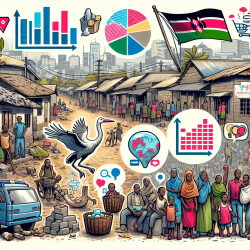Understanding Street-Connected Youth: Insights for Practitioners
As practitioners committed to creating positive outcomes for children, it is crucial to understand the diverse challenges faced by street-connected children and youth (SCCY), especially in resource-constrained settings. The research article, 'Pregnancy Has Its Advantages': The Voices of Street Connected Children and Youth in Eldoret, Kenya, provides valuable insights into the perceptions of pregnancy among SCCY in Eldoret, Kenya. This blog explores key findings from the study and suggests how practitioners can use this information to improve their skills and interventions.
Key Findings
The study revealed several critical themes regarding SCCY's perceptions of pregnancy:
- Gender Differences: Male SCCY often view having children as a means to elevate social status, while female SCCY see it as a survival mechanism.
- Desired Pregnancies: SCCY perceive pregnancy as a way to establish identity, hope, and lineage. For many, having children is a way to leave a legacy.
- Unwanted Pregnancies: These often result from transactional sex or rape, leading to unsafe abortions or abandonment of infants.
- Reproductive Health Inequities: Female SCCY lack agency in reproductive health decisions, often facing gender-based violence and pressure to have children.
Implications for Practitioners
Practitioners working with SCCY can enhance their interventions by considering the following:
- Gender-Sensitive Approaches: Tailor interventions to address the distinct needs and perceptions of male and female SCCY. This includes providing gender-sensitive reproductive health education and services.
- Empowerment Programs: Develop programs that empower female SCCY to make informed reproductive health decisions, reducing the risk of unwanted pregnancies and unsafe abortions.
- Collaborative Efforts: Work with local organizations and healthcare providers to create SCCY-friendly environments that offer comprehensive reproductive health services.
- Research and Advocacy: Encourage further research into the unique challenges faced by SCCY and advocate for policies that protect their rights and improve their access to healthcare.
Conclusion
Understanding the complex perceptions and challenges faced by SCCY regarding pregnancy is essential for practitioners aiming to create effective interventions. By adopting data-driven, gender-sensitive approaches, practitioners can make a significant impact on the lives of these vulnerable youth. To read the original research paper, please follow this link: 'Pregnancy Has Its Advantages': The Voices of Street Connected Children and Youth in Eldoret, Kenya.










